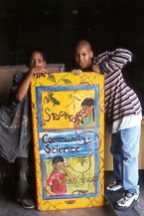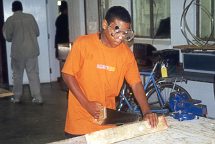2000 Best Practice Awards
"Local" Winners: Sacramento Area Office
 2000-1897 Community Science Center
2000-1897 Community Science Center
Sacramento, California
Contact: Jesse Martinez (916) 498-5220
The Community Science Workshop’s name
highlights it’s mission: The Workshop operates under the basic premise
that the ideal setting for learning science is a workshop-type setting where
children (and parents) use tools, develop hands-on skills, and gain confidence
as they actively  explore ideas, and design and build
projects of interest to them. The atmosphere of the Workshop is "exploratory
learning," which serves to overcome cultural limitations that may be
applied by some families to their children. The atmosphere is also intended
to break down gender roles.
explore ideas, and design and build
projects of interest to them. The atmosphere of the Workshop is "exploratory
learning," which serves to overcome cultural limitations that may be
applied by some families to their children. The atmosphere is also intended
to break down gender roles.
2000-1895 Hampton Square Apartments
Sacramento, California
Contact: Jesse Martinez (916) 498-5220
Hampton Square, previously known as the Phoenix
Apartments, was developed in 1971. The project has had several owners and
has cycled between good and poor conditions. As a result of recent increasing
criminal activity stemming from absentee management fueling overall decay,
city officials ordered the landlords to vacate 33 units, find residents
safe lodging and make the repairs to bring the structure back to code.
This launched the staff of Housing & Redevelopment to join forces with
a developer to purchase the building, which had the expertise to transform
this dilapidated complex into an affordable housing for low-income residents
of Stockton. City staff were able to partner up with Affordable Housing
Development Corporation (AHDC), a partnership between local government
and AHDC that took back a neighborhood and converted a severely substandard
apartment complex into an affordable low-income housing project that met
the needs of larger families in need of more space.
2000-889 The Building of the Ta/Hang Family
Home
Sacramento, California
Contact: Don F. Harris (916) 231-1999
In May of 1999, the Nehemiah Progressive
Housing Development Corporation made a one million dollar commitment to
Habitat for Humanity in order to help families across America to fulfill
their dream of owning a home. On May 14, 1999, ground was formally broken
for the first home that was being built through the Nehemiah and Habitat
for Humanity Partnership. On Saturday, May 27, 2000, the Ta/Hang Family
Home will be formally dedicated. The dream of owning a home has finally
come true for a deserving local family who also helped to build their own
home. This positive partnership between Nehemiah and Habitat for Humanity
has made the dream of homeownership a reality for one local family. This
is one of many homes that will be built through the Nehemiah Corporation
and Habitat for Humanity Partnership.
2000-990 Franklin Villa
Sacramento, California
Contact: Gregg Fortner (916) 440-1337
The Franklin Villa Sacramento Community Builder
team helped to coordinate a partnership with the Sacramento Housing and
Redevelopment Agency. This positive partnership led to the execution of
a purchase agreement between HUD and SHRA for our existing REO units in
Franklin Villa. This agreement was finalized in May, 1999.
2000-1136 Western Mobilehome Association
(WMA)
Sacramento, California
Contact: Sheila S. Dey (916) 448-7002
This Project is an on-going effort by WMA,
a state wide trade association representing owners of manufactured/mobilehome
parks, to educate our members regarding the Federal Fair Housing Act and
discrimination in housing. A variety of courses are offered in order to
accomplish this task. Examples of course titles are Discrimination Update,
Discrimination in Community Operations and an Open Forum on Housing Discrimination:
Fair Housing Jeopardy
These courses, and others, are offered through
WMA's Manufactured Housing Community Manager accreditation program. Classes
are offered in six locations throughout the state of California, three
times a year. Approximately 75 to 100 people attend at each location.
2000-1198 Sacramento County and Cities
Board on Homelessness (SC&CBoH)
Sacramento, California
Contact: Dick D. Skelton (916) 966-5500
The mission of the SC&CBoH is to develop
a five-year plan to comprehensively address the overall system of funding
and management of services designed to reduce homelessness within the Sacramento
community. Evaluating the entire homeless system will identify areas of
improvement, as well as measures which can be implemented to prevent other
"at risk" individuals from becoming homeless. Both the Sacramento
City Council and the Sacramento County Board of Supervisors approved the
formation of the SC&CBoH, including the project’s goal and focus
areas. The Sacramento City Council ratifies all appointments to the SC&CBoH
and Sacramento County Board of Supervisors, with staffing for the SC&CBoH
funded jointly by both jurisdictions.
2000-1896 Quan Ying Senior Apartments
Sacramento, California
Contact: Jesse Martinez (916) 498-5220
The building was once a 34 unit hotel built
in 1911. Between 1989 and 1996 the building was owned by the Salvation
Army and served as a homeless shelter. Over time, the building deteriorated
to a point where it was necessary to board up the structure due to serious
code violations. Because the building is located in a key location in central
downtown Stockton, the need to establish a partnership between local government
and the private sector was critical in the City’s commitment to revitalize
this central core of Stockton and more importantly, provide to affordable
Senior housing that is decent, safe and a better quality of living.
The building ownership changed to the Chinese
Benevolent Association (CBA) who formed the Quan Ying Foundation which
works to develop and maintain housing for low-income persons. The City
assisted CBA in finding a developer (Cyrus Youssefi) with a proven track
record in restorations of buildings into affordable low-income housing.
Today, this building is now a source of pride to the community of Stockton.
2000-1898 Small Agency's Capitalize on
Experience
Sacramento, California
Contact: Jesse Martinez (916) 498-5220
At HUD’s request, the San Joaquin Housing
Authority designed and delivered a one and a half day comprehensive training
for small housing authorities faced with transitioning from the CIAP to
the Capital Fund Program. 15 CIAP housing authorities within the jurisdiction,
as well as several new HUD staff members received customizable procedural
manuals complete with computer disks, with which to implement new Capital
Fund programs in compliance with HUD regulations. The training was based
on San Joaquin’s "High Performing" modernization program,
with clear, documented processes for program administration including procurement,
construction management, labor monitoring, section 3, and HUD reporting.
2000-1951 Great Start/Casey Family Program
Sacramento, California
Contact: Debra Payne (916) 263-3840
A collaborative partnership to provide employment,
education and support services (such as housing) to former foster youth
ages 18 to 24. The collaboration was spearheaded by the Sacramento Employment
and Training Agency (SETA) and the Department of Human Assistance in Sacramento
County. The two agencies brought together a variety of agencies including:
HUD Community Builder, the county welfare department, community-based non-profit
organizations, education officials, law enforcement, and the county housing
agency. This process has created a partnership that has developed and is
continuing to develop a comprehensive system of services to provide resources
and services to youth "aging" out of the foster system to help
them transition to independent living.
2000-2407 The Lorenz
Redding, California
Contact: Willie Smith (530) 243-6451
The Lorenz (originally the Lorenz Hotel)
was built in 1907. It was converted to elderly housing under the 231 program
in 1978. When the owner defaulted in the early 1990's, HUD foreclosed and,
after funding an extensive renovation, sold the Lorenz to Shasta Housing
Development corporation, a non-profit entity, in 1995 for $1. Recently,
the project was transferred to Christian Church Homes of Northern California
(CCHNC). Under a Use agreement and HAP contract, the Lorenz services mostly
frail elderly residents. This renovation has turned into a grand opportunity
to involve the Redding community as a whole in the lives of its seniors.
Local church groups, youth organizations, the Harley Davidson Club, and
others have already pledged volunteers for the renovation period.
2000-2424 Sacramento Section 5 (h) Homeownership
Program
Sacramento, California
Contact: Gregg Fortner (916) 440-1337
The Housing Authorities of the City and County
of Sacramento, California is selling single family houses to assisted housing
participants and low income public housing residents. The Sacramento Homeownership
Program has initiated the sale of contiguous houses located throughout
the City and County of Sacramento. The PHA is selling approximately 360
family houses. The Authority works in partnership with the Sacramento Redevelopment
Agency's First Time Homebuyers Program, the HOPE Program, Agency recognized
banking institutions (e.g. U.S. Bank) and homebuyer community organizations
(e.g. Home Loan Counseling). The Sacramento homeownership Program will
be available to qualified public housing residents, Section 8 participants,
FSS participants and low income residents of the City and County of Sacramento.
All houses are within close proximity to elementary schools, public transportation
and municipal services.
2000-2657 Sacramento Housing and Redevelopment
Agency (SHRA) Resident Employment Program
Sacramento, California
Contact: Marcia Vernon (916) 440-1995
Program entails the placement of residents
into several SHRA divisions for training and employment. A temporary service
agency processes the resident at the housing office; residents work Monday
through Friday, 8a-5. Pay rate is determined and income earned is excluded
from rent calculations; placement term is one year; various office duties
assigned; performance evaluations are conducted; graduates receive certification
of training and of successful completion. The Job Training program is a
proactive effort and greatly benefits all participants.
2000-3048 Vietnam Veterans of California,
Inc.
Sacramento, California
Contact: David M. Orozco (916) 393-9798
The SVRC HUD/VA Supportive Housing Program
is designed to house 32 honorably discharged homeless Veterans. Entry into
the SVRC-SHP is accomplished by enrolling in the SVRC Homeless Veterans
Reintegration Project, (HVRP). Needs assessments by program staff allow
only Veterans that are believed to benefit from services offered will be
given and application for SVRC-SHP. Veteran applicants must be willing
to identify specific barriers to employment and self-sufficiency, as well
as able to incorporate, with staff's guidance, a willingness to mitigate
those barriers as they move towards becoming self-sufficient members of
the larger community.
2000-1194 Mather Community Campus
Mather, California
Contact: Rondii Colson (916) 228-3102
Mather Community Campus is a transitional
housing and job training/employment program for homeless individuals and
families with children. This highly structured program provides life skills
and employment support for occupations directly related to the demands
of the local labor market. Students are assisted by staff to increase their
income, strengthen their self-determination and are prepared to sustain
permanent housing once the student graduates the program.
Each student is paired with a case Manager
and an employment services Worker who provide the primary program services
throughout the student's two year stay. Together the 'triad' develops a
Graduation plan for the student within the first 120 days after they move
in. Thereafter, the triad assists the student in obtaining necessary job
training and employment and to overcome a wide variety of personal barriers
to job retention and maintaining permanent housing. six months prior to
graduation, the triad begins preparing the student to exit the program
and transition into mainstream lifestyle. Graduates return as part of an
alumni group for continued mutual support and to serve as role models for
current students.